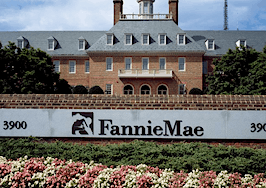There’s no question that factory-built homes are perhaps the least expensive alternative for people who want a home of their own.
The average price for a typical factory-built, three-bedroom, one- or two-bath house that is towed to its resting place was $70,600 in 2016, according to the Manufactured Housing Institute, a trade group. The median income of buyers that year, the last for which data is available, was $30,000.
Of course, that’s exclusive of land, which is why many buyers finance their homes with chattel loans as opposed to conventional loans. Chattel loans are those in which movable personal property secure the lien.
What are manufactured homes?
Manufactured houses are built on a chassis much like that of a trailer truck. Unless the tires are removed and the house is permanently placed on a foundation, it can be moved from place to place.
Consequently, it is considered personal rather than real property, such as a so-called “stick-built” house put up board-by-board and brick-by-brick at the building site.
Some 22 million people currently live in manufactured houses, which were once known rather derisively as trailers. Nowadays, they come in one, two, three or even four sections. They are sometimes stacked one atop the other with high pitched roofs that make them virtually indistinguishable from traditional homes. Some two-thirds of all units are on private property; the other third, in communities of numerous factory-built houses.
Gaining popularity, but not by much
Manufactured housing production has lagged in recent years, but it is on the rise. In 2013, only 60,200 units were built. But in 2017, 34 companies with 124 plants built 93,000 units, or 9 percent of all single-family housing starts.
Still, that’s a far cry from their best year for production, which was way back in 1998 when factories spit out nearly 373,000 units. Their worst year was in 2009, just a decade ago when they produced just under 50,000 units.
Financing manufactured homes
Now, researchers at the non-partisan Urban Institute’s Housing Finance Policy Center believe that if would-be buyers had a better understanding of the finance options available to them, the supply of these housing units would increase exponentially.
According to the Center’s Laurie Goodman and Bhargavi Ganesh, roughly 2 out of every 3 manufactured-homebuyers own the land upon which their homes are placed. Yet, they use chattel loans to finance their houses, even though such a loan does not require land ownership.
Had they been able to qualify for regular financing, which, of course, requires that borrowers own the land under their houses, they might have saved 4.4 percentage points a year on average in what they pay for the privilege of using a lender’s money.
Obviously, not all manufactured-homebuyers can qualify for a mortgage, and not all who do would save 4.4 points. But for those who can make the grade, Goodman and Ganesh reported in a recent research brief, the additional cost on an $80,000, 20-year loan works out to $2,600 a year, or 5.6 percent of income for a family making $50,000 a year.
Which loan is best?
The researchers suggest making the various financing options more clear. In doing so, they say, “maybe more buyers of manufactured homes would choose the more affordable mortgage, bringing down the cost and helping increase the currently low production of these affordable units.”
In some cases, it makes more sense to opt for a chattel loan. Some states, for example, tax personal property at a lower rate than real property. And if the land belongs to a family rather than an individual, the family might not want one member to encumber the entire property by placing a manufactured home in one corner.
Are manufactured-homebuyers getting a poor deal?
But producers often take the easy way out, titling their products as personal property as a matter of rote without explaining the choices to buyers or asking what they prefer. “In most states,” Goodman and Ganesh reported, “manufactured homes are titled by default as personal property, whether or not the buyer owns the land.”
Consequently, they said, “it’s up to the owner to change this designation by documenting land ownership and that the home is fixed to the land.”
That is often a hassle, especially since the rules differ from jurisdiction to jurisdiction. Obtaining a mortgage is a hassle, too, especially when chattel lenders sit in showrooms and buyers can walk away with a loan on the same day a contract is signed.
Mortgages, on the other hand, involve mounds of paperwork and often take weeks to learn whether an applicant qualifies or not.
In 2017, 81 percent of newly shipped manufactured homes were titled as personal property, making them eligible for only a chattel loan, and 19 percent were titled as real property, making them eligible for a mortgage.
Of those titled as personal property, 65 percent of their owners owned the land and could have qualified for a less expensive mortgage. In Texas, where 20 percent of all manufactured homes are shipped, the percentage was a tad bit higher at 68 percent.
Fannie Mae making things easier
Meanwhile, in a move that should make it easier to finance a manufactured house in the same way traditional houses are financed, Fannie Mae recently lowered the down payment requirement on mortgages it purchases from lenders from 5 percent to 3 percent.
The big government-sponsored enterprise has removed a previous requirement that borrowers pay an interest rate that includes a 0.5 percent add-on known as a “loan level price adjustment.”
Under the big mortgage investor’s MH Advantage program, mortgages on units titled as real estate will look almost exactly like a traditional mortgage, but with simplified appraisal and underwriting rules. The amount financed can include the cost of transporting the house to its site, site preparation and installation.
The units can include garages, carports and dormer windows that make them appear similar to site-built houses. But there is no need for a single lien that covers both the house and the land, which can be financed separately.
MH Advantage borrowers also can obtain a second-lien loan under Fannie Mae’s Community Seconds program, which allows for a combined 105 percent loan-to-value ratio. The new product also can be combined with loans Fannie Mae offers for renovation or home improvements that provide energy savings.
At the same time, Freddie Mac, Fannie’s chief rival on the secondary market, has promised to support manufactured housing titled as real property or chattel. Toward that end, it recently announced it would allow borrowers to finance both the construction of a house titled as real property as well and the cost of site prep, set up and delivery as a single loans with a single closing.
Lew Sichelman’s weekly column, “The Housing Scene,” is syndicated to newspapers throughout the country.













